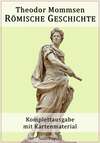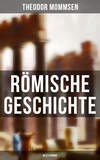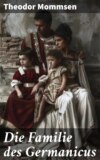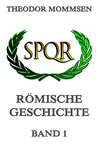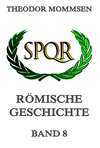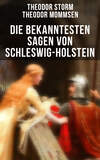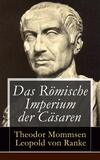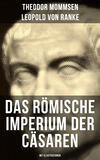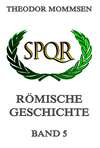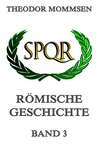Buch lesen: «The History of Rome, Book I», Seite 6
CHAPTER V
The Original Constitution of Rome
The Roman House
Father and mother, sons and daughters, home and homestead, servants and chattels—such are the natural elements constituting the household in all cases, where polygamy has not obliterated the distinctive position of the mother. But the nations that have been most susceptible of culture have diverged widely from each other in their conception and treatment of the natural distinctions which the household thus presents. By some they have been apprehended and wrought out more profoundly, by others more superficially; by some more under their moral, by others more under their legal aspects. None has equalled the Roman in the simple but inexorable embodiment in law of the principles pointed out by nature herself.
The House-father and His Household
The family formed an unity. It consisted of the free man who upon his father's death had become his own master, and the spouse whom the priests by the ceremony of the sacred salted cake (-confarreatio-) had solemnly wedded to share with him water and fire, with their son and sons' sons and the lawful wives of these, and their unmarried daughters and sons' daughters, along with all goods and substance pertaining to any of its members. The children of daughters on the other hand were excluded, because, if born in wedlock, they belonged to the family of the husband; and if begotten out of wedlock, they had no place in a family at all. To the Roman citizen a house of his own and the blessing of children appeared the end and essence of life. The death of the individual was not an evil, for it was a matter of necessity; but the extinction of a household or of a clan was injurious to the community itself, which in the earliest times therefore opened up to the childless the means of avoiding such a fatality by their adopting the children of others as their own.
The Roman family from the first contained within it the conditions of a higher culture in the moral adjustment of the mutual relations of its members. Man alone could be head of a family. Woman did not indeed occupy a position inferior to man in the acquiring of property and money; on the contrary the daughter inherited an equal share with her brother, and the mother an equal share with her children. But woman always and necessarily belonged to the household, not to the community; and in the household itself she necessarily held a position of domestic subjection—the daughter to her father, the wife to her husband,27 the fatherless unmarried woman to her nearest male relatives; it was by these, and not by the king, that in case of need woman was called to account. Within the house, however, woman was not servant but mistress. Exempted from the tasks of corn-grinding and cooking which according to Roman ideas belonged to the menials, the Roman housewife devoted herself in the main to the superintendence of her maid-servants, and to the accompanying labours of the distaff, which was to woman what the plough was to man.28 In like manner, the moral obligations of parents towards their children were fully and deeply felt by the Roman nation; and it was reckoned a heinous offence if a father neglected or corrupted his child, or if he even squandered his property to his child's disadvantage.
In a legal point of view, however, the family was absolutely guided and governed by the single all-powerful will of the "father of the household" (-pater familias-). In relation to him all in the household were destitute of legal rights—the wife and the child no less than the bullock or the slave. As the virgin became by the free choice of her husband his wedded wife, so it rested with his own free will to rear or not to rear the child which she bore to him. This maxim was not suggested by indifference to the possession of a family; on the contrary, the conviction that the founding of a house and the begetting of children were a moral necessity and a public duty had a deep and earnest hold of the Roman mind. Perhaps the only instance of support accorded on the part of the community in Rome is the enactment that aid should be given to the father who had three children presented to him at a birth; while their ideas regarding exposure are indicated by the prohibition of it so far as concerned all the sons—deformed births excepted—and at least the first daughter. Injurious, however, to the public weal as exposure might appear, the prohibition of it soon changed its form from that of legal punishment into that of religious curse; for the father was, above all, thoroughly and absolutely master in his household. The father of the household not only maintained the strictest discipline over its members, but he had the right and duty of exercising judicial authority over them and of punishing them as he deemed fit in life and limb. The grown-up son might establish a separate household or, as the Romans expressed it, maintain his "own cattle" (-peculium-) assigned to him by his father; but in law all that the son acquired, whether by his own labour or by gift from a stranger, whether in his father's household or in his own, remained the father's property. So long as the father lived, the persons legally subject to him could never hold property of their own, and therefore could not alienate unless by him so empowered, or yet bequeath. In this respect wife and child stood quite on the same level with the slave, who was not unfrequently allowed to manage a household of his own, and who was likewise entitled to alienate when commissioned by his master. Indeed a father might convey his son as well as his slave in property to a third person: if the purchaser was a foreigner, the son became his slave; if he was a Roman, the son, while as a Roman he could not become a Roman's slave, stood at least to his purchaser in a slave's stead (-in mancipii causa-). The paternal and marital power was subject to a legal restriction, besides the one already mentioned on the right Of exposure, only in so far as some of the worst abuses were visited by legal punishment as well as by religious curse. Thus these penalties fell upon the man who sold his wife or married son; and it was a matter of family usage that in the exercise of domestic jurisdiction the father, and still more the husband, should not pronounce sentence on child or wife without having previously consulted the nearest blood-relatives, his wife's as well as his own. But the latter arrangement involved no legal diminution of power, for the blood-relatives called in to the domestic judgment had not to judge, but simply to advise the father of the household in judging.
But not only was the power of the master of the house substantially unlimited and responsible to no one on earth; it was also, as long as he lived, unchangeable and indestructible. According to the Greek as well as Germanic laws the grown-up son, who was practically independent of his father, was also independent legally; but the power of the Roman father could not be dissolved during his life either by age or by insanity, or even by his own free will, excepting only that the person of the holder of the power might change, for the child might certainly pass by way of adoption into the power of another father, and the daughter might pass by a lawful marriage out of the hand of her father into the hand of her husband and, leaving her own -gens- and the protection of her own god to enter into the -gens- of her husband and the protection of his god, became thenceforth subject to him as she had hitherto been to her father. According to Roman law it was made easier for the slave to obtain release from his master than for the son to obtain release from his father; the manumission of the former was permitted at an early period, and by simple forms; the release of the latter was only rendered possible at a much later date, and by very circuitous means. Indeed, if a master sold his slave and a father his son and the purchaser released both, the slave obtained his freedom, but the son by the release simply reverted into his father's power as before. Thus the inexorable consistency with which the Romans carried out their conception of the paternal and marital power converted it into a real right of property.
Closely, however, as the power of the master of the household over wife and child approximated to his proprietary power over slaves and cattle, the members of the family were nevertheless separated by a broad line of distinction, not merely in fact but in law, from the family property. The power of the house-master—even apart from the fact that it appeared in operation only within the house—was of a transient, and in some degree of a representative, character. Wife and child did not exist merely for the house-father's sake in the sense in which property exists only for the proprietor, or in which the subjects of an absolute state exist only for the king; they were the objects indeed of a legal right on his part, but they had at the same time capacities of right of their own; they were not things, but persons. Their rights were dormant in respect of exercise, simply because the unity of the household demanded that it should be governed by a single representative; but when the master of the household died, his sons at once came forward as its masters and now obtained on their own account over the women and children and property the rights hitherto exercised over these by the father. On the other hand the death of the master occasioned no change in the legal position of the slave.
Family and Clan (-Gens-)
So strongly was the unity of the family realized, that even the death of the master of the house did not entirely dissolve it. The descendants, who were rendered by that occurrence independent, regarded themselves as still in many respects an unity; a principle which was made use of in arranging the succession of heirs and in many other relations, but especially in regulating the position of the widow and unmarried daughters. As according to the older Roman view a woman was not capable of having power either over others or over herself, the power over her, or, as it was in this case more mildly expressed, the "guardianship" (-tutela-) remained with the house to which she belonged, and was now exercised in the room of the deceased house-master by the whole of the nearest male members of the family; ordinarily, therefore, by sons over their mother and by brothers over their sisters. In this sense the family, once founded, endured unchanged till the male stock of its founder died out; only the bond of connection must of course have become practically more lax from generation to generation, until at length it became impossible to prove the original unity. On this, and on this alone, rested the distinction between family and clan, or, according to the Roman expression, between -agnati- and -gentiles-. Both denoted the male stock; but the family embraced only those individuals who, mounting up from generation to generation, were able to set forth the successive steps of their descent from a common progenitor; the clan (-gens-) on the other hand comprehended also those who were merely able to lay claim to such descent from a common ancestor, but could no longer point out fully the intermediate links so as to establish the degree of their relationship. This is very clearly expressed in the Roman names: when they speak of "Quintus, son of Quintus, grandson of Quintus and so on, the Quintian," the family reaches as far as the ascendants are designated individually, and where the family terminates the clan is introduced supplementary, indicating derivation from the common ancestor who has bequeathed to all his descendants the name of the "children of Quintus."
Dependents of the Household
To these strictly closed unities—the family or household united under the control of a living master, and the clan which originated out of the breaking-up of such households—there further belonged the dependents or "listeners" (-clientes-, from -cluere-). This term denoted not the guests, that is, the members of other similar circles who were temporarily sojourning in another household than their own, and as little the slaves, who were looked upon in law as the property of the household and not as members of it, but those individuals who, while they were not free burgesses of any commonwealth, yet lived within one in a condition of protected freedom. These included refugees who had found a reception with a foreign protector, and those slaves in respect of whom their master had for the time being waived the exercise of his rights, and so conferred on them practical freedom. This relation had not the distinctive character of a strict relation -de jure-, like that of a man to his guest: the client remained a man non-free, in whose case good faith and use and wont alleviated the condition of non-freedom. Hence the "listeners" of the household (-clientes-) together with the slaves strictly so called formed the "body of servants" (-familia-) dependent on the will of the "burgess" (-patronus-, like -patricius-). Hence according to original right the burgess was entitled partially or wholly to resume the property of the client, to reduce him on emergency once more to the state of slavery, to inflict even capital punishment on him; and it was simply in virtue of a distinction -de facto-, that these patrimonial rights were not asserted with the same rigour against the client as against the actual slave, and that on the other hand the moral obligation of the master to provide for his own people and to protect them acquired a greater importance in the case of the client, who was practically in a more free position, than in the case of the slave. Especially must the -de facto- freedom of the client have approximated to freedom -de jure- in those cases where the relation had subsisted for several generations: when the releaser and the released had themselves died, the -dominium- over the descendants of the released person could not be without flagrant impiety claimed by the heirs at law of the releaser; and thus there was gradually formed within the household itself a class of persons in dependent freedom, who were different alike from the slaves and from the members of the -gens- entitled in the eye of the law to full and equal rights.
The Roman Community
On this Roman household was based the Roman state, as respected both its constituent elements and its form. The community of the Roman people arose out of the junction (in whatever way brought about) of such ancient clanships as the Romilii, Voltinii, Fabii, etc.; the Roman domain comprehended the united lands of those clans.29 Whoever belonged to one of these clans was a burgess of Rome. Every marriage concluded in the usual forms within this circle was valid as a true Roman marriage, and conferred burgess-rights on the children begotten of it. Whoever was begotten in an illegal marriage, or out of marriage, was excluded from the membership of the community. On this account the Roman burgesses assumed the name of the "father's children" (-patricii-), inasmuch as they alone in the eye of the law had a father. The clans with all the families that they contained were incorporated with the state just as they stood. The spheres of the household and the clan continued to subsist within the state; but the position which a man held in these did not affect his relations towards the state. The son was subject to the father within the household, but in political duties and rights he stood on a footing of equality. The position of the protected dependents was naturally so far changed that the freedmen and clients of every patron received on his account toleration in the community at large; they continued indeed to be immediately dependent on the protection of the family to which they belonged, but the very nature of the case implied that the clients of members of the community could not be wholly excluded from its worship and its festivals, although, of course, they were not capable of the proper rights or liable to the proper duties of burgesses. This remark applies still more to the case of the protected dependents of the community at large. The state thus consisted, like the household, of persons properly belonging to it and of dependents—of "burgesses" and of "inmates" or —metoeci—.
The King
As the clans resting upon a family basis were the constituent elements of the state, so the form of the body-politic was modelled after the family both generally and in detail. The household was provided by nature herself with a head in the person of the father with whom it originated, and with whom it perished. But in the community of the people, which was designed to be imperishable, there was no natural master; not at least in that of Rome, which was composed of free and equal husbandmen and could not boast of a nobility by the grace of God. Accordingly one from its own ranks became its "leader" (-rex-) and lord in the household of the Roman community; as indeed at a later period there were to be found in or near to his dwelling the always blazing hearth and the well-barred store-chamber of the community, the Roman Vestas and the Roman Penates—indications of the visible unity of that supreme household which included all Rome. The regal office began at once and by right, when the position had become vacant and the successor had been designated; but the community did not owe full obedience to the king until he had convoked the assembly of freemen capable of bearing arms and had formally challenged its allegiance. Then he possessed in its entireness that power over the community which belonged to the house-father in his household; and, like him, he ruled for life. He held intercourse with the gods of the community, whom he consulted and appeased (-auspicia publica-), and he nominated all the priests and priestesses. The agreements which he concluded in name of the community with foreigners were binding upon the whole people; although in other instances no member of the community was bound by an agreement with a non-member. His "command" (-imperium-) was all-powerful in peace and in war, on which account "messengers" (-lictores-, from -licere-, to summon) preceded him with axes and rods on all occasions when he appeared officially. He alone had the right of publicly addressing the burgesses, and it was he who kept the keys of the public treasury. He had the same right as a father had to exercise discipline and jurisdiction. He inflicted penalties for breaches of order, and, in particular, flogging for military offences. He sat in judgment in all private and in all criminal processes, and decided absolutely regarding life and death as well as regarding freedom; he might hand over one burgess to fill the place of a slave to another; he might even order a burgess to be sold into actual slavery or, in other words, into banishment. When he had pronounced sentence of death, he was entitled, but not obliged, to allow an appeal to the people for pardon. He called out the people for service in war and commanded the army; but with these high functions he was no less bound, when an alarm of fire was raised, to appear in person at the scene of the burning.
As the house-master was not simply the greatest but the only power in the house, so the king was not merely the first but the only holder of power in the state. He might indeed form colleges of men of skill composed of those specially conversant with the rules of sacred or of public law, and call upon them for their advice; he might, to facilitate his exercise of power, entrust to others particular functions, such as the making communications to the burgesses, the command in war, the decision of processes of minor importance, the inquisition of crimes; he might in particular, if he was compelled to quit the bounds of the city, leave behind him a "city-warden" (-praefectus urbi-) with the full powers of an -alter ego-; but all official power existing by the side of the king's was derived from the latter, and every official held his office by the king's appointment and during the king's pleasure. All the officials of the earliest period, the extraordinary city-warden as well as the "leaders of division" (-tribuni-, from -tribus-, part) of the infantry (-milites-) and of the cavalry (-celeres-) were merely commissioned by the king, and not magistrates in the subsequent sense of the term. The regal power had not and could not have any external check imposed upon it by law: the master of the community had no judge of his acts within the community, any more than the housefather had a judge within his household. Death alone terminated his power. The choice of the new king lay with the council of elders, to which in case of a vacancy the interim-kingship (-interregnum-) passed. A formal cooperation in the election of king pertained to the burgesses only after his nomination; -de jure- the kingly office was based on the permanent college of the Fathers (-patres-), which by means of the interim holder of the power installed the new king for life. Thus "the august blessing of the gods, under which renowned Rome was founded," was transmitted from its first regal recipient in constant succession to those that followed him, and the unity of the state was preserved unchanged notwithstanding the personal change of the holders of power.
This unity of the Roman people, represented in the field of religion by the Roman Diovis, was in the field of law represented by the prince, and therefore his costume was the same as that of the supreme god; the chariot even in the city, where every one else went on foot, the ivory sceptre with the eagle, the vermilion-painted face, the chaplet of oaken leaves in gold, belonged alike to the Roman god and to the Roman king. It would be a great error, however, to regard the Roman constitution on that account as a theocracy: among the Italians the ideas of god and king never faded away into each other, as they did in Egypt and the East. The king was not the god of the people; it were much more correct to designate him as the proprietor of the state. Accordingly the Romans knew nothing of special divine grace granted to a particular family, or of any other sort of mystical charm by which a king should be made of different stuff from other men: noble descent and relationship with earlier rulers were recommendations, but were not necessary conditions; the office might be lawfully filled by any Roman come to years of discretion and sound in body and mind.30 The king was thus simply an ordinary burgess, whom merit or fortune, and the primary necessity of having one as master in every house, had placed as master over his equals—a husbandman set over husbandmen, a warrior set over warriors. As the son absolutely obeyed his father and yet did not esteem himself inferior, so the burgess submitted to his ruler without precisely accounting him his better. This constituted the moral and practical limitation of the regal power. The king might, it is true, do much that was inconsistent with equity without exactly breaking the law of the land: he might diminish his fellow-combatants' share of the spoil; he might impose exorbitant task-works or otherwise by his imposts unreasonably encroach upon the property of the burgess; but if he did so, he forgot that his plenary power came not from God, but under God's consent from the people, whose representative he was; and who was there to protect him, if the people should in return forget the oath of allegiance which they had sworn? The legal limitation, again, of the king's power lay in the principle that he was entitled only to execute the law, not to alterit. Every deviation from the law had to receive the previous approval of the assembly of the people and the council of elders; if it was not so approved, it was a null and tyrannical act carrying no legal effect. Thus the power of the king in Rome was, both morally and legally, at bottom altogether different from the sovereignty of the present day; and there is no counterpart at all in modern life either to the Roman household or to the Roman state.
The Community
The division of the body of burgesses was based on the "wardship," -curia- (probably related to -curare- = -coerare-, —koiranos—); ten wardships formed the community; every wardship furnished a hundred men to the infantry (hence -mil-es-, like -equ-es-, the thousand-walker), ten horsemen and ten councillors. When communities combined, each of course appeared as a part (-tribus-) of the whole community (-tota-in Umbrian and Oscan), and the original unit became multiplied by the number of such parts. This division had reference primarily to the personal composition of the burgess-body, but it was applied also to the domain so far as the latter was apportioned at all. That the curies had their lands as well as the tribes, admits of the less doubt, since among the few names of the Roman curies that have been handed down to us we find along with some apparently derived from -gentes-, e. g. -Faucia-, others certainly of local origin, e. g. -Veliensis-; each one of them embraced, in this primitive period of joint possession of land, a number of clan-lands, of which we have already spoken.31
We find this constitution under its simplest form32 in the scheme of the Latin or burgess communities that subsequently sprang up under the influence of Rome; these had uniformly the number of a hundred councillors (-centumviri-). But the same normal numbers make their appearance throughout in the earliest tradition regarding the tripartite Rome, which assigns to it thirty curies, three hundred horsemen, three hundred senators, three thousand foot-soldiers.
Nothing is more certain than that this earliest constitutional scheme did not originate in Rome; it was a primitive institution common to all the Latins, and perhaps reached back to a period anterior to the separation of the stocks. The Roman constitutional tradition quite deserving of credit in such matters, while it accounts historically for the other divisions of the burgesses, makes the division into curies alone originate with the origin of the city; and in entire harmony with that view not only does the curial constitution present itself in Rome, but in the recently discovered scheme of the organization of the Latin communities it appears as an essential part of the Latin municipal system.
The essence of this scheme was, and remained, the distribution into curies. The tribes ("parts") cannot have been an element of essential importance for the simple reason that their occurrence at all was, not less than their number, the result of accident; where there were tribes, they certainly had no other significance than that of preserving the remembrance of an epoch when such "parts" had themselves been wholes.33 There is no tradition that the individual tribes had special presiding magistrates or special assemblies of their own; and it is highly probable that in the interest of the unity of the commonwealth the tribes which had joined together to form it were never in reality allowed to have such institutions. Even in the army, it is true, the infantry had as many pairs of leaders as there were tribes; but each of these pairs of military tribunes did not command the contingent of a tribe; on the contrary each individual war-tribune, as well as all in conjunction, exercised command over the whole infantry. The clans were distributed among the several curies; their limits and those of the household were furnished by nature. That the legislative power interfered in these groups by way of modification, that it subdivided the large clan and counted it as two, or joined several weak ones together, there is no indication at all in Roman tradition; at any rate this took place only in a way so limited that the fundamental character of affinity belonging to the clan was not thereby altered. We may not therefore conceive the number of the clans, and still less that of the households, as a legally fixed one; if the -curia- had to furnish a hundred men on foot and ten horsemen, it is not affirmed by tradition, nor is it credible, that one horseman was taken from each clan and one foot-soldier from each house. The only member that discharged functions in the oldest constitutional organization was the -curia-. Of these there were ten, or, where there were several tribes, ten to each tribe. Such a "wardship" was a real corporate unity, the members of which assembled at least for holding common festivals. Each wardship was under the charge of a special warden (-curio-), and had a priest of its own (-flamen curialis-); beyond doubt also levies and valuations took place according to curies, and in judicial matters the burgesses met by curies and voted by curies. This organization, however, cannot have been introduced primarily with a view to voting, for in that case they would certainly have made the number of subdivisions uneven.
Equality of the Burgesses
Sternly defined as was the contrast between burgess and non-burgess, the equality of rights within the burgess-body was complete. No people has ever perhaps equalled that of Rome in the inexorable rigour with which it has carried out these principles, the one as fully as the other. The strictness of the Roman distinction between burgesses and non-burgesses is nowhere perhaps brought out with such clearness as in the treatment of the primitive institution of honorary citizenship, which was originally designed to mediate between the two. When a stranger was, by resolution of the community, adopted into the circle of the burgesses, he might surrender his previous citizenship, in which case he passed over wholly into the new community; but he might also combine his former citizenship with that which had just been granted to him. Such was the primitive custom, and such it always remained in Hellas, where in later ages the same person not unfrequently held the freedom of several communities at the same time. But the greater vividness with which the conception of the community as such was realized in Latium could not tolerate the idea that a man might simultaneously belong in the character of a burgess to two communities; and accordingly, when the newly-chosen burgess did not intend to surrender his previous franchise, it attached to the nominal honorary citizenship no further meaning than that of an obligation to befriend and protect the guest (-jus hospitii-), such as had always been recognized as incumbent in reference to foreigners. But this rigorous retention of barriers against those that were without was accompanied by an absolute banishment of all difference of rights among the members included in the burgess community of Rome. We have already mentioned that the distinctions existing in the household, which of course could not be set aside, were at least ignored in the community; the son who as such was subject in property to his father might thus, in the character of a burgess, come to have command over his father as master. There were no class-privileges: the fact that the Tities took precedence of the Ramnes, and both ranked before the Luceres, did not affect their equality in all legal rights. The burgess cavalry, which at this period was used for single combat in front of the line on horseback or even on foot, and was rather a select or reserve corps than a special arm of the service, and which accordingly contained by far the wealthiest, best-armed, and best-trained men, was naturally held in higher estimation than the burgess infantry; but this was a distinction purely -de facto-, and admittance to the cavalry was doubtless conceded to any patrician. It was simply and solely the constitutional subdivision of the burgess-body that gave rise to distinctions recognized by the law; otherwise the legal equality of all the members of the community was carried out even in their external appearance. Dress indeed served to distinguish the president of the community from its members, the grown-up man under obligation of military service from the boy not yet capable of enrolment; but otherwise the rich and the noble as well as the poor and low-born were only allowed to appear in public in the like simple wrapper (-toga-) of white woollen stuff. This complete equality of rights among the burgesses had beyond doubt its original basis in the Indo-Germanic type of constitution; but in the precision with which it was thus apprehended and embodied it formed one of the most characteristic and influential peculiarities of the Latin nation. And in connection with this we may recall the fact that in Italy we do not meet with any race of earlier settlers less capable of culture, that had become subject to the Latin immigrants.34 They had no conquered race to deal with, and therefore no such condition of things as that which gave rise to the Indian system of caste, to the nobility of Thessaly and Sparta and perhaps of Hellas generally, and probably also to the Germanic distinction of ranks.
–Hospes, quod deico, paullum est. Asta ac pellige. Heic est sepulcrum haud pulcrum pulcrai feminae, Nomen parentes nominarunt Claudiam, Suom mareitum corde dilexit sovo, Gnatos duos creavit, horunc alterum In terra linquit, alium sub terra locat; Sermone lepido, tum autem incessu commodo, Domum servavit, lanam fecit. Dixi. Abei.-
(Corp. Inscr. Lat. 1007.)
Still more characteristic, perhaps, is the introduction of wool-spinning among purely moral qualities; which is no very unusual occurrence in Roman epitaphs. Orelli, 4639: -optima et pulcherrima, lanifica pia pudica frugi casta domiseda-. Orelli, 4861: -modestia probitate pudicitia obsequio lanificio diligentia fide par similisque cetereis probeis femina fuit-. Epitaph of Turia, i. 30: domestica bona pudicitiae, opsequi, comitatis, facilitatis, lanificiis [tuis adsiduitatis, religionis] sine superstitione, ornatus non conspiciendi, cultus modici.











